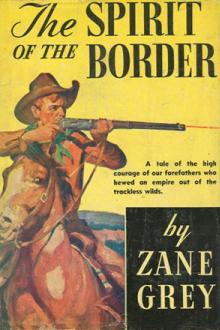The U. P. Trail, Zane Grey [robert munsch read aloud .txt] 📗

- Author: Zane Grey
Book online «The U. P. Trail, Zane Grey [robert munsch read aloud .txt] 📗». Author Zane Grey
“Go up!... To what?” queried Neale, eagerly.
“Well, that’s why he consulted us, I guess,” laughed Henney. “You see, we sort of had to make something to promote you to, for the present.”
“Oh, I see! I was wondering what job there could be,” replied Neale, and he laughed, too. “What did the chief say?”
“He said a lot. Figured you’d land at the top if the U. P. is ever built.... Chief engineer!... Superintendent of maintenance of way!”
“Good Lord!” breathed Neale. “You’re not in earnest?”
“Wal, I shore am, as your cowboy pard says,” returned Henney. And then he spoke with real earnestness. “Listen, Neale. Here’s the matter in a nutshell. You will be called upon to run these particular and difficult surveys, just as yesterday. But no more of the routine for you. Added to that, you will be sent forward and back, inspecting, figuring. You can make your headquarters with us or in the construction camps, as suits your convenience. All this, of course, presently, when we get farther on. So you will be in a way free—your own boss a good deal of the time. And fitting yourself for that ‘maintenance of way’ job. In fact, the chief said that—he called you Maintenance-of-Way Neale. Well, I congratulate you. And my advice is keep on as you’ve begun—go straight—look out for your wildness and temper.... That’s all. Good night.”
Then he went out, leaving Neale speechless.
Neale had many callers that night, and the last was Larry Red King. The cowboy stooped to enter the tent.
“Wal, how aboot you-all?” he drawled.
“Not so good, Red,” replied Neale. “My head’s hot and I’ve got a lot of pain. I think I’m going to be a little flighty. Would you mind getting your blankets and staying with me tonight?”
“I reckon I’d be glad,” answered King. He put a hand on Neale’s face. “You shore have fever.” He left the tent, to return presently with a roll of blankets and a canteen. Then he awkwardly began to bathe Neale’s face with cold water. There was a flickering camp-fire outside that threw shadows on the wall of the tent. By its light Neale saw that King’s left hand was bandaged and that he used it clumsily.
“What’s wrong with your hand?” he queried.
“I reckon nawthin’.”
“Why is it bound up, then?”
“Wal, some one sent thet fool army doctor to me an’ he said I had two busted bones in it.”
“He did! I had no idea you were hurt. You never said a word. And you carried me and my instrument all day—with a broken hand!”
“Wal, I ain’t so shore it’s broke.”
Neale swore at his friend and then he fell asleep. King watched beside him, ever and anon rewetting the hot brow.
The camp-fire died out, and at length the quietness of late night set in. The wind mourned and lulled by intervals; a horse thudded his hoofs now and then; there were the soft, steady footsteps of the sentry on guard, and the wild cry of a night bird.
5
Neale had not been wrong when he told the engineers that once they had a line surveyed across the gorge and faced the steep slopes of the other side their troubles would be magnified.
They found themselves deeper in the Wyoming hills, a range of mountains that had given General Lodge great difficulty upon former exploring trips, and over which a pass had not yet been discovered.
The old St. Vrain and Laramie Trail wound along the base of these slopes and through the valleys. But that trail was not possible for a railroad. A pass must be found—a pass that would give a grade of ninety feet to the mile. These mountains had short slopes, and they were high.
It turned out that the line as already surveyed through ravines and across the gorge had to be abandoned. The line would have to go over the hills. To that end the camp was moved east again to the first slopes of the Wyoming hills; from there the engineers began to climb. They reached the base of the mountains, where they appeared to be halted for good and all.
The second line, so far as it went, overlooked the Laramie Trail, which fact was proof that the old trail-finders had as keen eyes as engineers.
With a large band of hostile Sioux watching their movements the engineer corps found it necessary to have the troops close at hand all the time. The surveyors climbed the ridges while the soldiers kept them in sight from below. Day after day this futile search for a pass went on. Many of the ridges promised well, only to end in impassable cliffs or breaks or ascents too steep. There were many slopes and they all looked alike. It took hard riding and hard climbing. The chief and his staff were in despair. Must their great project fail because of a few miles of steep ascent? They would not give up.
The vicinity of Cheyenne Pass seemed to offer encouragement. Camp was made in the valley on a creek. From here observations were taken. One morning the chief, with his subordinates and a scout, ascended the creek and then through the pass to the summit. Again the old St. Vrain and Laramie Trail lay in sight. And again the troops rode along it, with the engineers above.
The chief with his men rode on and up farther than usual; farther than they ought to have gone unattended. Once the scout halted and gazed intently across the valley.
“Smoke signals over thar,” he said.
The engineers looked long, but none of them saw any smoke. They moved on. But the scout called them back.
“Thet bunch of redskins has split on us. Fust thing we’ll run into some of them.”
It was Neale’s hawk eye that first sighted Indians. “Look! Look!” he cried, in great excitement, as he pointed with shaking finger.
Down a grassy slope of a ridge Indians were riding, evidently to head off the engineers, to get between them and the troops.
“Wal, we’re in fer it now,” declared the scout. “We can’t get back the way we come up.”
The chief gazed coolly at the Indians and then at the long ridge sloping away from the summit. He had been in tight places before.
“Ride!” was his order.
“Let’s fight!” cried Neale.
The band of eight men were well armed and well mounted, and if imperative, could have held off the Sioux for a time. But General Lodge and the scout headed across a little valley and





Comments (0)